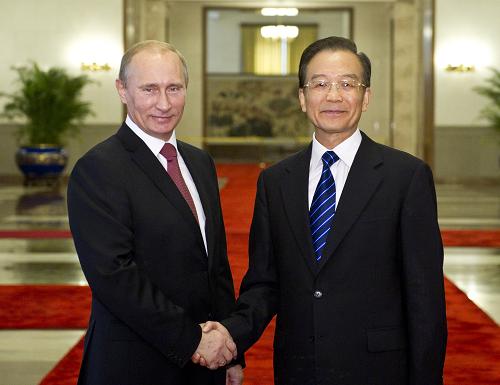Visit advances friendship
 0 Comment(s)
0 Comment(s) Print
Print E-mail
China Daily, October 12, 2011
E-mail
China Daily, October 12, 2011
 |
|
Premier Wen Jiabao meets Russian Prime Minister Vladimir Putin in Beijing on Oct 11, 2011. |
Russian Prime Minister Vladimir Putin is on a tight schedule after his arrival in Beijing on Tuesday for a two-day official visit to China. But his visit will bear fruitful results in expanding both the width and depth of bilateral cooperation and further cementing the long tradition of Sino-Russian friendship.
The visit has drawn global interest, as it is Putin's first foreign trip since he revealed plans to reclaim Russia's presidency last month and the visit signals that the two neighbors, as two important players on the world stage, are determined to work closely on bilateral and international issues.
Leading a 250-member delegation, including top business leaders, Putin is witnessing the signing of a series of agreements on bilateral trade and participating in the 16th regular meeting between the two countries' premiers.
The regular meeting mechanism, first established in 1996, has become an important platform for guiding and coordinating bilateral cooperation.
Recent years have seen Sino-Russian relations reach unprecedented levels. Bilateral ties are now in the best shape they have ever been and Beijing and Moscow, enjoying a high degree of mutual trust, have set a good example for steering international relations, especially relations between big powers.
They are increasingly looked upon as a reliable force for world peace and stability. As advocates of the principle of non-interference in the internal affairs of a sovereign state, they have jointly thwarted several international actions that might otherwise have jeopardized regional peace and stability.
During Chinese President Hu Jintao's state visit to Russia in June, leaders of both countries laid out a strategic blueprint for the development of bilateral ties in the next decade. Putin's visit indicates the two countries are actively carrying out the consensus reached by both countries to advance bilateral cooperation on all fronts.
Sino-Russian cooperation in trade and energy has been the cornerstone of bilateral ties, injecting sustained vitality into bilateral cooperation. In 2010, bilateral trade grew by 43.1 percent year-on-year to reach $55.45 billion.
China became the largest trade partner for Russia last year and the two have vowed to increase bilateral trade to $100 billion by 2015 and $200 billion by 2020.
At a time when the world is bracing for a possible second financial crisis stemming from Europe, the two emerging economies' resolve to cement trade ties and tap into the potential of cooperation in other fields will benefit their own growth and bolster global confidence.
Given the two countries' clout on the world stage, the significance of Sino-Russian cooperation goes beyond the bilateral sphere. Sharing the same or similar views on a wide range of world issues, Beijing and Moscow are sure to contribute even more to the shaping of a multi-polar world and the democratization of the international order.






Go to Forum >>0 Comment(s)